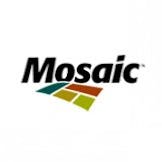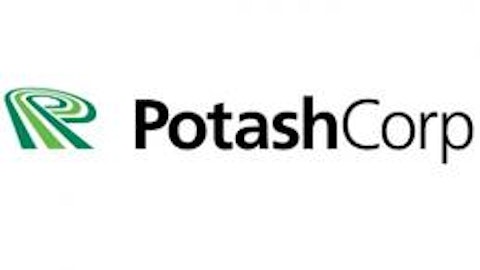In mid July, $23 billion market cap fertilizer company Mosaic Co (NYSE:MOS), which provides both phosphate- and potash-based fertilizers, reported its financial results for the fiscal year ending in May 2013. The fiscal Q4 numbers showed a 5% decline in revenue versus a year earlier, which the company attributed to low demand in emerging markets (particularly India). Mosaic Co (NYSE:MOS) was able to reduce its costs more or less in line with revenue, however, and so with little change in net margins earnings were down at a similar rate. For the year as a whole the company recorded $4.42 in diluted earnings per share, as lower profits over the course of the entire FY were offset by a reduction in weighted average share count. The stock was down between 3 and 4% on the news even though EPS narrowly beat analyst expectations.
At its current price, Mosaic Co (NYSE:MOS) trades at 12 times trailing earnings; fertilizer companies, as well as many other stocks tied to agriculture, tend to carry earnings multiples in roughly the same range. Some analysts believe that a growing and more wealthy global population will lead to higher demand for agriculture in the long term, and combined with the market’s lukewarm attitude towards the industry it is a somewhat common investment theme. Of course, we’ve seen from Mosaic Co (NYSE:MOS)’s recent results that there has been negative growth recently, and even though this is supposed to be a long term trend it would be preferable to see some actual evidence that bulls’ predictions are playing out.

The closest peers for Mosaic Co (NYSE:MOS) are Potash Corp./Saskatchewan (USA) (NYSE:POT) and CF Industries Holdings, Inc. (NYSE:CF). Potash Corp. had grown its revenue and earnings at double-digit rates in the first quarter of 2013 from their levels a year ago, and so at least at that point was doing well.
Markets therefore price it at a small premium to Mosaic, with the stock trading at 15 times trailing earnings, though note that that is fairly cheap pricing if the company continues to grow at decent rates. We’d also note that at current prices Potash Corp’s dividend yield is 3.5%. CF is the cheapest of this peer group- for example, its forward P/E is only 8- though its business has been struggling with significant declines in the company’s sales and pretax income (with earnings only rising on a lower effective tax rate). Still, the stock is priced at enough of a discount to make it worth considering.
Mosaic can also be compared to smaller fertilizer company CVR Partners LP (NYSE:UAN) and to fertilizer wholesaler and retailer Agrium Inc. (USA) (NYSE:AGU). CVR is valued at 14 times earnings, whether we consider its trailing results or analyst consensus forecasts for 2014 (note that this implies the sell-side is expecting little earnings growth at the company). Financial performance has actually been decent and once again it looks like the market has low expectations for the business. Agrium, which recently headed off an activist challenge from Barry Rosenstein’s JANA Partners attempting to split up the company, shares these other players’ trend to low earnings multiples as both the trailing and forward P/Es are 9. We would warn that revenue and earnings have been down, going by recent reports, but if the company could stabilize it would be a value play at current pricing.
In summary, fertilizer and agriculture related stocks are generally valued at prices which imply the market is looking for little to no growth going forward- and in some cases, declining earnings seem to be priced in. As a result we think that Mosaic and its peers are well worth looking into as things stand and certainly if an investor is convinced that agriculture has high growth potential as an industry then one or more of these stocks would be worthwhile ways to play that thesis.
Disclosure: I own no shares of any stocks mentioned in this article.


